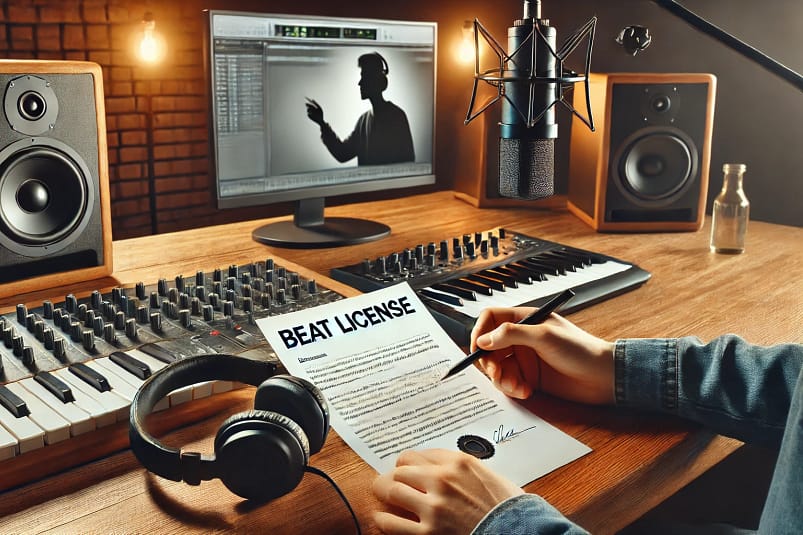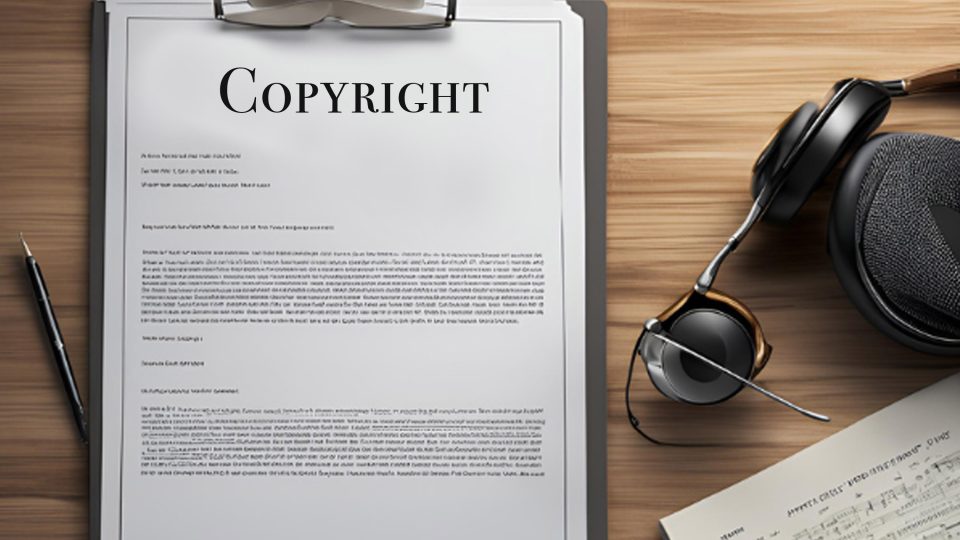Understanding Copyright in Beat Leasing
In this blog, we explore the exciting world of copyright in beat leasing—disclaimer* It’s not terribly exciting. From ownership rights to sample usage, we will be arming you with the knowledge necessary to protect your intellectual property and grow your beatmaking business.
What Is Copyright in the Context of Beats and Beat Leasing?
Copyright law gives you as a creator the right to control the reproduction, distribution, and monetization of your work. If you specialise in creating beats to lease these rules will help you to protect your work from the moment your track is created. Your beats represent your intellectual property. You are therefore free to use and exploit your beats in any way you choose.
While copyright is automatically applied as soon as a beat is first conceived, to fully cover yourself it’s advisable to register your creations so there’s proof that you actually do own the rights. This will protect you if there are ever any legal disputes. Registering your beats also gives you the power to license your work to others—such as through beat leasing—while retaining full ownership and control.
Exclusive vs. Non-Exclusive Leases and Copyright Implications
Exclusive and non-exclusive leases are the two main beat leasing models. Each has different copyright implications. Let’s take a look at both types.
Exclusive Leases
In an exclusive lease, you as the the beatmaker will grant the licensee full rights to the beat. This means you are no longer be able to sell or lease the beat to anyone else. This doesn’t however mean you give up all control over the beat. Typically, unless stipulated, copyright control will remain with the beatmaker with the artist gaining exclusive usage rights. These types of lease generally command a much higher price due to the exclusivity and increased rights granted to the artist.
Non-Exclusive Leases
In a non-exclusive lease, you retain full control over the beat. This means you can sell or lease it to multiple artists. Copyright ownership and control will therefore remain entirely with you, the beatmaker. The artist leasing the beat will be granted limited rights as laid out in the licence agreement. Non-exclusive leases are a popular choice for beatmakers as you can generate multiple revenue streams from a single beat and still retain ownership. They are also a cost-effective option for artists as they provide an affordable way to record and put out music.

Copyright Clauses to Include in Beat Leasing Contracts
In order to cover yourself and the copyright of your creations you must have a well-structured contract. This will help to cover you in any disputes as well as provide clarity for the licensee. Here are some key copyright-related clauses to include in your contracts:
- Copyright Retention: Clearly state that the copyright remains with you, the creator. This ensures that you retain ownership and the power to control the way it’s used.
- Usage Rights: Specify the specific rights being granted to the lessee. These can include the right to record, distribute, perform, or monetize the beat. You can also set usage limitations. For example, you may want to restrict usage to a certain number of streams or sales for non-exclusive leases. You can set up a threshold that if exceeded (i.e the track is streamed over 1M times) some form of royalty arrangement comes into play.
- Prohibited Actions: Include a clause that prevents reselling, sublicensing, of the track. You can also stipulate that you don’t want the beat altered beyond agreed-upon terms. This ensures that the beat’s usage is controlled, helping to maintain its integrity.
- Credit Requirements: Outline how the lessee should credit you as the beatmaker. This not only helps protect your copyright, it also helps to control your brand and reputation as a beatmaker.
Using Samples and the Copyright Implications
We have covered how copyright covers your beats in relation to beat licences but what if your tracks contain samples? Sampling is commonplace in beatmaking but producers are often unaware of the copyright implications sampling can introduce. Let’s explore some different sampling scenarios and examine their impact on copyright.

Royalty-Free Samples
The least complicated form of sampling in terms of copyright are royalty-free samples. As the name suggests these samples can be used without any obligation to pay further royalties. The copyright will still however remain with the sample creator. There may also be other restrictions on the use of royalty-free samples. Many royalty-free sample licenses have conditions, such as prohibiting the resale of samples as standalone loops or restricting certain commercial uses.
It is vital that you read and comply with the sample providers terms and conditions. Check whether their license allows you to use their samples in leased or commercially sold beats and whether any specific credits are required.
And finally, as with any 3rd party sample use any, any recordings that feature a sample are not legible for distribution to content ID systems.
Royalty-Bearing Samples
Some samples are royalty-bearing, which means that when you use these samples in your beats, you must share royalties with the sample creator or the library. There may well be clauses relating to the royalty percentage and when any such royalty payments would kick in.
Whatever the specific details of the royalty share, these must be clearly communicated and made clear to anyone purchasing a licence. Anyone leasing your beat will be required to adhere to the sample provider’s terms. For example, if your beat includes a royalty-bearing sample, your lease agreement should mention that the lessee is responsible for paying a percentage of royalties generated from the song’s distribution. In practise this might prove hard to enforce. It may therefore be more diligent to structure the agreement so that you continue collecting royalties from the licensee and distribute them accordingly to the sample creator.
Sampling Old Recordings (Clearing Samples)
When a producer samples an existing recording, especially a copyrighted one, they need to obtain permission— sample clearance. This means you must seek permission from the owner of the recording copyright (usually a record label) and the owner of the composition copyright (typically the songwriter or publisher). If you don’t clear the sample you risk legal action.
For beatmakers involved in leasing, it’s generally best to completely avoid using samples from copyrighted recordings. Even if you have the financial resources to clear the sample it is unlikely a potential artist would be in a position to pay for a further sample clearance. Remember that just because you have cleared a sample, if it’s used in someone else’s recording it will need to be cleared again.
Copyright Tips
Understanding copyright concerning beat leasing can be complex and confusing. Here are some shorthand tips to help you understand your rights and those of your licence.
- Avoid Using Unlicensed Samples: For less copyright issues avoid using uncleared 3rd party samples or samples that contain usage clauses.
- Keep Contracts Clear: Make sure your contracts clearly outline copyright ownership, usage rights, and credit requirements. Ambiguous and unclear contracts can lead to misunderstandings and disputes.
- Use Beat Tags: Beat tags act as a great way of watermarking and in turn protecting the copyright of your beats. They are also an effective tool for branding your beats with your name.
- Consult a Professional: If you are unsure of any aspects of copyright in relation to selling your beats it is advisable to consult with a professional for advice. This could apply to drafting contracts or dealing with copyright issues if a track using your beat was to blow up.
- Maintain good close relations with your customers: The best way to monitor whether any copyright infringements have taken place is to nurture strong relationships with the artists leasing your beats. This is a good general rule as it also helps build trust and a relationship built on trust is likely to yield more beat sales.
Summary
While it’s not the most thrilling of subjects, understanding copyright law and how it applies to your beats is vital if you are in the beat leasing industry. By understanding and managing copyright effectively, you can protect your work, maximize your income, and establish a successful beat leasing business. The clearer you are in your understanding and communication of copyright position the less lightly you are to run into problems down the line. So keep protected and keep those beats coming.
Remember – RouteNote Create subscriptions start from as little as $2.99. You also get 10 FREE credits to spend on samples along with access to our FREE sample pack bundle when you sign-up!
